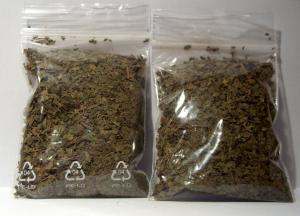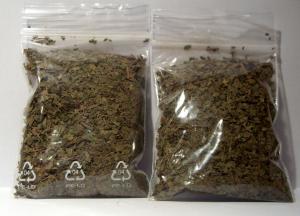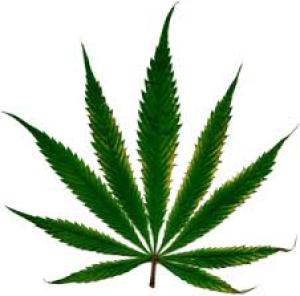Kratom is used by chronic pain sufferers and people wishing to get off or stay off opioids, but not for much longer.
A federal appeals court upholds the ban on gun sales to medical marijuana patients, Arkansans will have two medical marijuana initiatives on the ballot, Oklahomans will likely have none, and more.
An Ohio sheriff gets popped for his pain pill habit, a New Mexico cop videotapes himself stealing marijuana, a San Francisco cop heads to prison for illegal tactics and lying about them, and more.
Lots of California news today, plus, a Montana anti-marijuana initiative is dead.
It's another all-marijuana news day today. Initiative battles are heating up, New York's Health Department wants to expand the medical marijuana program, and more.
Cornhuskers look down the road on marijuana reforms, Pennsylvania's governor calls for marijuana decriminalization, the Oklahoma medical marijuana initiative looks like it won't actually make the ballot, and more.
The DEA announces it will make the active ingredients in kratom Schedule I substances, marijuana legalization initiatives in Arizona and Michigan go to court, the Thai government is moving to reform the way it deals with meth, and more.
President Obama continues commuting drug sentences, the 9th Circuit upholds a ban on gun ownership for medical marijuana patients, Albuquerque gets sued over its asset forfeiture scheme, and more.
It the end of easy access for Montana medical marijuana patients, the Arizona Supreme Court rejects the last challenge to that state's legalization initiative, the second Arkansas medical marijuana initiative is now officially on the ballot, Chris Christie signs a needle exchange funding bill, and more.
The DEA announced Tuesday that it plans to crack down on kratom, a Southeast Asian plant that has gained increasing popularity among chronic pain sufferers and people wishing to wean themselves from opioids.

Kratom. Only on the shelves for another 30 days. (Creative Commons)
--
on Schedule I of the Controlled Substances Act, the same schedule as heroin. The move will take effect by the end of September and will be in effect for up to three years."Kratom has a high potential for abuse, has no currently accepted medical use in treatment in the United States, and has a lack of accepted safety for use under medical supervision," the defining characteristics of a Schedule I drug, the DEA said.
Kratom was traditionally used in Thailand and Malaysia to help endure physical labor, relieve pain, and stop diarrhea. It was also good for relieving the symptoms of opium withdrawal.
That's because it acts like an opiate. Its active ingredients activate the same opioid receptors heroin and prescription pain pills do. And it behaves like an opiate -- with a couple of exceptions, one interesting and one quite important.
Like other opiates, it relieves pain, slows bowel activity, produces euphoric feelings, and creates physical addiction and a withdrawal syndrome. But unlike other opiates, it causes a pleasant, caffeine-type buzz in small doses and, more significantly, it is apparently very difficult -- if not impossible -- to overdose on it. The few deaths where kratom is implicated include poly-drug use, or as in a case reported by the New York Times, suicide by a young kratom user who was also being treated for depression.
And it has caught on here in the United States, especially among pain patients and people seeking to transition from opioid addiction, so much so that the DEA said it needed to act "in order to avoid an imminent threat to public safety." Calls to poison control centers about kratom jumped from a mere two between 2000 and 2005 to 660 between 2010 and 2015. DEA reported 15 "kratom-related" deaths between 2014 and now.
But that's out of millions of doses. According to DEA's own data, at least 130,000 pounds of kratom was seized by law enforcement in the last two years, and the FDA has ordered another 140,000 pounds of the stuff held pending an admissibility decision. That's enough for some 12 million doses, and that's just what they seized.
The DEA decision will doubtless lead to the removal of falsely-labeled and tainted products claiming to be kratom, but it's also likely to drive thousands of people with chronic pain and opioid problems back to the substances they were trying to avoid. And when it comes to lethality, kratom is opium's mild-mannered little sister. While the DEA cites 15 deaths linked to kratom since 2014, there were more than 29,000 fatal opioid overdoses in 2014 alone.
back to top
A federal appeals court upholds the ban on gun sales to medical marijuana patients, Arkansans will have two medical marijuana initiatives on the ballot, Oklahomans will likely have none, and more.
ArkansasLast Thursday, a second medical marijuana initiative was okayed for the ballot. The state already has one medical marijuana initiative on the ballot, the 2016 Arkansas Medical Cannabis Act, and state officials announced Thursday that a second initiative, the Arkansas Medical Marijuana Amendment, will also appear on the ballot, even though they have yet to certify that it has enough signatures to do so. That's because Thursday was the deadline to certify ballot issues. Because the secretary of state's office was not able to verify late signatures before the deadline, the second initiative has been "certified to the ballot and assigned a number." If the initiative actually comes up short on signatures, votes for it in November will not be recorded.
On Monday, the state Democratic Party endorsed medical marijuana. With two competing medical marijuana initiatives on the ballot, the state Democratic Party has approved a platform plank endorsing medical marijuana. The plank calls for "the development of a responsible medical marijuana program that will receive patients in need of such relief the freedom to access this remedy."
California
On Wednesday, a federal appeals court upheld the ban on gun sales to medical marijuana patients. The 9th US Circuit Court of Appeals in San Francisco ruled Wednesday that the federal government's ban on gun sales to medical marijuana cardholders does not violate the 2nd Amendment. The decision came in the case of a Nevada woman turned away from a gun shop after obtaining a medical marijuana card. The ruling sets precedent for all nine states in the circuit, including California, Oregon, and Washington.
Florida
Last Thursday, the medical marijuana initiative was polling above 67%. The Amendment 2 medical marijuana amendment initiative appears headed for victory in November. A new poll from the University of Florida Bob Graham Center has support at 67.8%, in line with a slew of polls since early 2015 that show the initiative will a low of 61% approval and up to 80%. Because the initiative is a constitutional amendment, it needs 60% to pass.
Montana
Last Wednesday, an anti-marijuana zealot gave up on his initiative to repeal the state's medical marijuana law. Billings auto dealer Steve Zabawa has given up the ghost on his effort to get an anti-marijuana initiative on the state ballot. His measure would have repealed the state's already seriously gutted medical marijuana law (a measure that has made the ballot, I-182, seeks to reinstate the original law) and declare that any drug illegal under federal law is illegal under state law. He came up short on signatures, lost an initial court challenge, and now says he doesn't have time to appeal to the state Supreme Court. Zabawa said he will now concentrate on trying to defeat I-182.
New York
Last Thursday, the state Health Department called for expanding the medical marijuana program In a report marking the two-year anniversary of the state's medical marijuana program, the Department of Health called for expanding the program to meet patient needs. "To meet additional patient demand and increase access to medical marijuana throughout New York State, NYSDOH recommends registering five additional organizations over the next two years, using a phased-in approach to permit their smooth integration into the industry," the report said.
On Tuesday, the Health Department announced an expansion of the medical marijuana program. The state Department of Health said Tuesday it will allow nurse practitioners to recommend medical marijuana for patients and allow dispensaries to make deliveries. The department also said it was considering whether to include chronic pain on the state's list of qualifying conditions.
Oklahoma
On Monday, advocaes said the medical marijuana initiative was unlikely to appear on the ballot. The group behind the initiative, State Question 788, said they will challenge the attorney general's rewording of the battle title, and that will begin a legal process that will delay the measure beyond the November 8 election date. State officials, on the other hand, said the initiative campaign waited too long to turn in signatures. "We are dealing with processes established in both federal and state election law for initiatives proposed by the people that require specific procedures to be followed," Attorney General Scott Pruitt (R) said. "It's important for the people of Oklahoma to know -- regardless of the substance of the state question -- the signatures were not submitted with enough time to allow this process to be played out completely."
[For extensive information about the medical marijuana debate, presented in a neutral format, visit MedicalMarijuana.ProCon.org.]
back to top
An Ohio sheriff gets popped for his pain pill habit, a New Mexico cop videotapes himself stealing marijuana, a San Francisco cop heads to prison for illegal tactics and lying about them, and more. Let's get to it:
In Fremont, Ohio, the Sandusky County sheriff was arrested last Tuesday after a local grand jury indicted him for allegedly illegal obtaining prescription drugs and misusing department funds. Sheriff Kyle Overmyer was indicted on 43 counts, including misusing department money and tampering with records. State investigators said he took pills from prescription drug disposal boxes and deceived doctors and pharmacists to obtain more.In Jackson, Mississippi, a Hinds County sheriff's deputy was arrested last Wednesday for trying to illegally obtain pain pills. Deputy Douglas Jay Nelson, 54, is accused of conspiring to possess and possessing 30 Oxycodone tablets.
In Grants, New Mexico, a Grants police sergeant was arrested last Wednesday after unwittingly recording himself on a body camera taking marijuana from his office and giving it to his girlfriend. Sgt. Roshern McKinney is also accused of embezzling $785 and a half-pound brick of weed that he never submitted to the department's evidence room. He is charge with distribution of marijuana, conspiracy, and felony embezzlement.
In Sanford, Florida, a Seminole County sheriff's jail deputy was arrested last Thursday on charges he stole prescription pain pills from a narcotics storage safe on at least four occasions. Lt. Jason Bender is accused of stealing around 40 pills, 10 each on four different occasions, for his own use. He faces four counts of grand theft of a controlled substance.
In San Francisco, a former San Francisco police officer was sentenced Tuesday to a year and two months in federal prison for conducting an unlawful search of a residential hotel room and writing a false report about it. Arshad Razzak, 44, had been convicted on four counts of conspiring to violate civil rights, violating the rights of a hotel resident during the search, falsifying an informant's pay slip, and falsifying a police report.
back to top
Lots of California news today, plus a Montana anti-marijuana initiative folds.

A bill to rein in asset forfeiture abuses has passed the California legislature and now awaits Gov. Brown's signature.
California Legislature Passes Cottage Cannabis Production Bill. The measure, Assembly Bill 2516, would establish a new medical marijuana cultivator license category for what sponsor Assemblyman Jim Woods (D-North Coast) calls "microfarmers." The category would apply to farmers with 2,500 square feet or less for mixed-light cultivation, 500 square feet for indoor cultivation, or up to 25 mature marijuana plants for outdoor cultivation. The bill now goes to the desk of Gov. Jerry Brown (D).
California's Legal Marijuana Industry Could Generate $6.5 Billion a Year, Report Says. A new report from Arcview Market Research estimates that legalizing marijuana in the state would create a $6.5 billion annual market by 2020. That would make California the "epicenter" of legal marijuana in the US.
Medical Marijuana
Montana Anti-Marijuana Zealot Gives Up on Initiative to Repeal Medical Marijuana Law. Billings auto dealer Steve Zabawa has given up the ghost on his effort to get an anti-marijuana initiative on the state ballot. His measure would have repealed the state's already seriously gutted medical marijuana law (a measure that has made the ballot, I-182, seeks to reinstate the original law) and declare that any drug illegal under federal law is illegal under state law. He came up short on signatures, lost an initial court challenge, and now says he doesn't have time to appeal to the state Supreme Court. Zabawa said he will now concentrate on trying to defeat I-182.
Asset Forfeiture
California Legislature Approves Asset Forfeiture Reform Bill. A bill that would require a criminal conviction before seizing assets in cases involving less than $40,000 has passed the legislature and is now on the desk of Gov. Jerry Brown (D). The measure, Senate Bill 443, sponsored by Sen. Holly Mitchell (D-Los Angeles), would also prohibit police from partnering with federal agencies in drug busts in order to get around state asset forfeiture laws.
back to top
It's another all-marijuana news day today. Initiative battles are heating up, New York's Health Department wants to expand the medical marijuana program, and more.
Marijuana PolicyCalifornia's Prop 64 Campaign Has Raised More Than $11 Million. The campaign to legalize marijuana in California it out-fundraising the opposition by a margin of 61 to 1, according to new campaign finance reports. The Prop 64 campaign has raised $11.45 million, while the No on 64 opposition campaign has raised only $185,000. Prop 64 has received more than $2.3 million from tech billionaire Sean Parker, $750,000 from Weedmaps founder Justin Hartfield, $1.5 million from the New Approach PAC, and $1.25 million from Drug Policy Action, among others. Opposition funding is coming from Smart Approach to Marijuana, the California Teamsters, and law enforcement.
Nevada Law Enforcement Comes Out Against Question 2. At a Carson City press conference Thursday, state Attorney General Adam Laxalt and other law enforcement officials came out in opposition to the Question 2 marijuana legalization initiative. The claimed "this ballot initiative was written by major marijuana interests, who's bigger concern is making money," not the greater good of Nevadans, and cited concerns about impaired driving.
Tennessee Governor Opposes Decrim in Memphis and Nashville. The state's two largest cities are both considering decriminalizing small-time marijuana possession, but Republican Gov. Bill Haslam wants none of it. "I'm not a fan," he says. "While I do think we've had some people who have spent more time in jail than they need to for that. I'm not in favor of decriminalizing that."
Medical Marijuana
Second Arkansas Initiative Will Be on Ballot, Even If It Doesn't Qualify. The state already has one medical marijuana initiative on the ballot, the 2016 Arkansas Medical Cannabis Act, and state officials announced Thursday that a second initiative, the Arkansas Medical Marijuana Amendment, will also appear on the ballot, even though they have yet to certify that it has enough signatures to do so. That's because Thursday was the deadline to certify ballot issues. Because the secretary of state's office was not able to verify late signatures before the deadline, the second initiative has been "certified to the ballot and assigned a number." If the initiative actually comes up short on signatures, votes for it in November will not be recorded.
Florida Medical Marijuana Initiative Polling Above 67%. The Amendment 2 medical marijuana amendment initiative appears headed for victory in November. A new poll from the University of Florida Bob Graham Center has support at 67.8%, in line with a slew of polls since early 2015 that show the initiative will a low of 61% approval and up to 80%. Because the initiative is a constitutional amendment, it needs 60% to pass.
New York Health Department Calls for Expanding Medical Marijuana Program. In a report marking the two-year anniversary of the state's medical marijuana program, the Department of Health called for expanding the program to meet patient needs. "To meet additional patient demand and increase access to medical marijuana throughout New York State, NYSDOH recommends registering five additional organizations over the next two years, using a phased-in approach to permit their smooth integration into the industry," the report said.
back to top
Cornhuskers look down the road on marijuana reforms, Pennsylvania's governor calls for marijuana decriminalization, the Oklahoma medical marijuana initiative looks like it won't actually make the ballot, and more.

Pennsylvania Gov. Tom Wolf (D) says decriminalize it. (Creative Commons/Wikipedia)
Nebraska 2018 Legalization Initiative Campaign Gets Underway. A group calling itself Legal Marijuana Now has begun a signature gathering drive for an initiative that would legalize possession of up to an ounce of pot for medical or recreational purposes. The group is aiming at 2018 and needs roughly 87,000 valid voter signatures to qualify.
Pennsylvania Governor Calls for Marijuana Decriminalization. Gov. Tom Wolf (D) said Monday the state needs to decriminalize the possession of small amounts of pot. While some localities have quit arresting small-time pot possessors, too many haven't. "I think we need to do that in a more systematic fashion," Wolf said. "There are too many people who are going to prison because of the use of very modest amounts or carry modest amounts of marijuana, and that is clogging up our prisons, it's destroying families and it's hurting our economy, so I think decriminalization is the first step."
Medical Marijuana
Oklahoma Initiative Unlikely to Appear on Ballot, Advocates Say. The group behind the initiative, State Question 788, said they will challenge the attorney general's rewording of the battle title, and that will begin a legal process that will delay the measure beyond the November 8 election date. State officials, on the other hand, said the initiative campaign waited too long to turn in signatures. "We are dealing with processes established in both federal and state election law for initiatives proposed by the people that require specific procedures to be followed," Attorney General Scott Pruitt (R) said. "It's important for the people of Oklahoma to know -- regardless of the substance of the state question -- the signatures were not submitted with enough time to allow this process to be played out completely."
International
New Zealand Poll Finds Strong Support for Medical Marijuana. Another poll is signaling overwhelming support for medical marijuana among Kiwis. A new UMR poll has support at 76%, up four points from the same poll last year. The poll had only 12% opposed, with another 12% undecided. The poll also asked whether marijuana should be treated as a herbal remedy; 61% said yes.
back to top
The DEA announces it will make the active ingredients in kratom Schedule I substances, marijuana legalization initiatives in Arizona and Michigan go to court, the Thai government is moving to reform the way it deals with meth, and more.

Kratom is headed for Schedule I (Creative Commons/Wikipedia)
Arizona Legalization Campaign Sues Over Ballot Description. The Campaign to Regulate Marijuana Like Alcohol filed a lawsuit Monday asking the state Supreme Court to fix what is says is inaccurate language in the ballot description of Prop 205 that will be presented to voters. The description written by Secretary of State Michele Reagan left out information that the campaign says is important, such as noting that a new 15% marijuana tax would go mainly to schools. The Supreme Court is also hearing a challenge from opponents of Prop 205. It needs to finalize the ballot language today.
Michigan Legalization Campaign Asks State Supreme Court to Put Initiative on Ballot. In a last ditch bid to get its legalization initiative on the November ballot, MI Legalize has filed a motion with the Supreme Court asking it to overturn a lower court's ruling that the state had no obligation to include signatures gathered outside a 180-day window. MI Legalize gathered more than enough signatures to qualify for the ballot, but some of them were deemed too old to be counted.
Medical Marijuana
Arkansas Democratic Party Endorses Medical Marijuana. With two competing medical marijuana initiatives on the ballot, the state Democratic Party has approved a platform plank endorsing medical marijuana. The plank calls for "the development of a responsible medical marijuana program that will receive patients in need of such relief the freedom to access this remedy."
Drug Policy
DEA to Place Kratom on Schedule I. The DEA announced Wednesday that it is moving to place the active materials in the kratom plant on Schedule I of the Controlled Substances Act. That schedule is reserved for drugs that have no medical use and a high potential for abuse. The scheduled substances are mitragynine and 7-hydroxymitragynine. Kratom is a tropical tree indigenous to Southeast Asia. It produces opioid-like effects and has been marketed as a legal alternative to controlled substances. Not anymore, though.
International
Hundreds of Argentine Judges, Lawyers Call for End to Drug War. Some 500 magistrates, lawyers, and other legal figures used the 30th anniversary of key Supreme Court decision to call for an end to the war on drugs. In 1986, in the "Bazterrica" ruling, the nation's high court ruled it unconstitutional to prosecute people for simple drug possession. Yet Argentine law still allows such prosecutions. The legal figures are demanding that the law be changed to be in compliance with the Bazterrica ruling.
Thailand Takes Another Step Toward Moving Meth off Dangerous Drugs List. The Justice Ministry is set to remove methamphetamine from its list of dangerous drugs, which would allow health authorities to use it for medical reasons. The move is part of a larger shift in how the country deals with drug use, and is part of a bill that will emphasize treatment for drug users, including substituting prescription stimulants such as Modafinil for meth. The government has given no time line for when the bill will move.
back to top
President Obama continues commuting drug sentences, the 9th Circuit upholds a ban on gun ownership for medical marijuana patients, Albuquerque gets sued over its asset forfeiture scheme, and more.

Obama meets federal prisoners at El Reno, Oklahoma. (whitehouse.gov)
Federal Appeals Court Upholds Ban on Gun Sales to Medical Marijuana Cardholders. The 9th US Circuit Court of Appeals in San Francisco ruled Wednesday that the federal government's ban on gun sales to medical marijuana cardholders does not violate the 2nd Amendment. The decision came in the case of a Nevada woman turned away from a gun shop after obtaining a medical marijuana card. The ruling sets precedent for all nine states in the circuit, including California, Oregon, and Washington.
New York Expands Program, Will Allow Medical Marijuana Deliveries. The state Department of Health said Tuesday it will allow nurse practitioners to recommend medical marijuana for patients and allow dispensaries to make deliveries. The department also said it was considering whether to include chronic pain on the state's list of qualifying conditions.
Asset Forfeiture
Albuquerque Sued for Refusing to Shut Down Asset Forfeiture Program. An Albuquerque woman whose car was seized after he son was pulled over for drunk driving filed suit in state court Wednesday arguing that the city's asset forfeiture program violates recently passed state-level asset forfeiture reforms and "is driven by a pernicious -- and unconstitutional -- profit incentive" that deprives her of her due process rights. Although the state passed the reforms last year, the city has continued to seize vehicles like Harjo's, arguing the law does not apply to it. The city was already sued by two lawmakers, but that suit was dismissed, with the court ruling they lacked standing to sue. The city has seized more than 8,000 vehicles since 2010.
Pardons and Commutations
President Obama Commutes Sentences for 111 More Drug Offenders. The president continued his pardon push Wednesday, commuting sentences for 111 more drug offenders. That brings to 325 the number pardoned this month alone -- a record -- and to 673 the number whose sentences Obama has commuted throughout his term. That's more than the previous 10 presidents combined.
International
Mexico Federal Police Chief Fired Over Massacre of Cartel Suspects. President Enrique Pena Nieto Monday fired federal police chief Enrique Gallindo over the apparent massacre of 22 suspected cartel members in Michoacan last year. Earlier this month, the National Human Rights Commission released a report saying the victims had been "executed arbitrarily."
back to top
It the end of easy access for Montana medical marijuana patients, the Arizona Supreme Court rejects the last challenge to that state's legalization initiative, the second Arkansas medical marijuana initiative is now officially on the ballot, Chris Christie signs a needle exchange funding bill, and more.

Chris Christie does the right thing on needle exchange. (Creative Commons/Gage Skidmore)
More Smoke Pot, Fewer Find it Risky, Survey Reports. Survey data shows more adults are using marijuana, they are using it more often, and they're less inclined to think it's risky than in the past, research results reported in The Lancet found. The number of adults using marijuana in the past year has jumped to 32 million -- going from one in ten in 2002 to one in eight in 2014. Only one-third of adults thought weekly marijuana use was risky, down from half in 2002.
Alaska Attorney General Says Pot Social Clubs Are Illegal. State Attorney General Jahna Lindemuth said in a legal opinion Wednesday that marijuana social clubs are illegal. "Under Alaska law, a business cannot sell or provide marijuana or allow marijuana to be consumed on the premises unless it is licensed as a retail marijuana store by the Marijuana Control Board," Lindemuth wrote. The ruling does not apply to retail pot shops, for which state regulators are considering rules that would allow on-site cannabis consumption.
Arizona Supreme Court Rejects Challenges to Pot Legalization Initiative. Arizonans will be voting on Proposition 205 on November 8. The state Supreme Court has thrown out the last challenges to the measure, which accused it of misleading voters with its language, but the high court upheld a lower court ruling that Prop 205 substantially complies with legal requirements for initiatives.
Medical Marijuana
It's Official: Second Arkansas Initiatives Qualifies for the Ballot. Secretary of State Mark Martin's office said Wednesday that the Arkansas Medical Marijuana Amendment had submitted sufficient valid voter signatures to qualify for the November ballot. That means Arkansas voters will have two medical marijuana initiatives to vote on. The Arkansas Medical Cannabis Act was approved for the ballot in July. If both pass, the one with the most votes goes into effect.
Delaware Governor Signs Bill Allowing Medical Marijuana for Terminally Ill. Gov. Jack Markell (D) Wednesday signed into law "Bob's Bill," named for lung cancer patient Robert Jester, who died in 2014 without being able to legally use marijuana to ease his suffering. The bill allows for medical marijuana for terminally ill patients, including those under 18 who are suffering pain, anxiety, or depression.
Montana Medical Marijuana Patients Now Out of Luck. In the biggest medical marijuana rollback ever, as of September 1, medical marijuana dispensaries are now illegal, and up to 12,000 patients have lost legal access to marijuana. Medical marijuana providers are now limited to three patients, and thousands of patients have no provider. This is the end result of the GOP-led legislature's 2011 move to gut the state's voter-approved medical marijuana law. An initiative that would restore the state's medical marijuana system, I-182, has been approved for the November ballot.
Harm Reduction
New Jersey Governor Signs Needle Exchange Funding Bill. Gov. Christ Christie (R) Wednesday signed into law Assembly Bill 415, which creates permanent funding for five locally run needle exchange programs. Three of them, in Atlantic City, Camden, and Paterson, had already run out of funds and were close to closing their doors. "These programs not only distribute clean syringes to intravenous drug users, but also deliver lifesaving education, treatment, and testing to their participants," according to Christie's bill-signing statement.
New Psychoactive Substances
California Bill Would Make Possession of Synthetic Cannabinoids, Stimulants a Crime. The legislature has approved a bill requested by the California Narcotics Officers Association that would make first-time possession of specified synthetic cannabinoids or stimulants an infraction, with subsequent offenses treated as misdemeanors. Under current state law, selling the drugs is a crime, but possessing them isn't. The measure, Senate Bill 139, now goes to the desk of Gov. Jerry Brown (D). It is opposed by the ACLU and the Drug Policy Alliance.
International
EU Wants to Ban New, Powerful Synthetic Cannabinoid. The European Commission announced Wednesday that it wants to ban MDMB-CHMICA, also known as "Black Mamba," a synthetic cannabinoid reportedly 10 times stronger than already banned synthetic cannabinoids. The European Monitoring Center on Drugs and Drug Abuse reported that it has been linked to at least 42 "acute intoxications" and 29 deaths.
Philippines President Snubs UN Effort to Meet Over Drug Killings. President Rodrigo Duterte has turned down a meeting with UN Secretary-General Ban Ki-moon after threatening last month to quit the UN over its criticism of the mass killings of drug users and dealers since he came to office three months ago. Officials from Duterte's office said he was too busy to meet with the head of the global body. One UN official said it was "basically unheard of" for a national leader to be "too busy" to meet the secretary-general.
back to top








